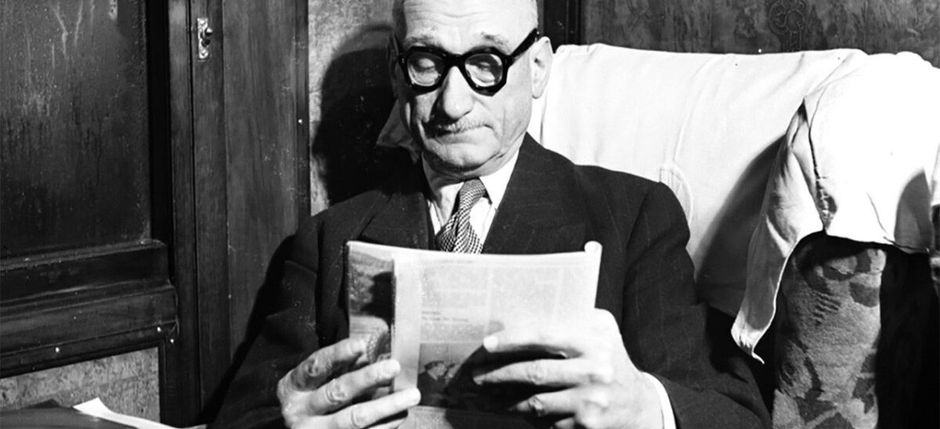A saintly politician?!
The ‘heroic virtues’ of Robert Schuman, were recognised by Pope Francis two years ago in the first stage of a long process towards canonisation.
06 SEPTEMBER 2023 · 13:00 CET

A Catholic friend used to tell me how handy it was to be a Catholic because when you needed a parking place you could pray to St Christopher. Or when you had lost something you called on St Antony of Padua.
In times of fear, St Michael the Archangel was the one to beseech, or St. Teresa of Kolkata when facing a mess—physical or emotional. In really impossible situations, you could pray: ‘Hey Jude, don’t let me down’.
And if you think this is all rather medieval, you obviously haven’t heard of St. Clare, the patron of TV’s and screens. She is a real godsend to those struggling with passwords or remote controls that don’t work and other technological issues.
Protestants miss out on all this help from above, having always rejected the cult of saint-veneration and the cult of relics, the veneration of the bones, teeth, hair or fingernails of saints, believed to have supernatural and healing properties.
Sometimes they reacted violently, smashing images of saints in churches, particularly here in the Low Countries.
Catholics draw on the concept of ‘the communion of the saints’ and are inspired by the lives of over 10,000 official saints collected over the centuries
Or less violently by shedding the names of saints from their churches, such as Amsterdam’s oldest church, known for its first 250 years as the St Nicolas Kerk and for the 500 years since simply as de Oude Kerk, the Old Church.Anglican Churches chose a middle way and many are still named after saints.
‘Saints’ as used by Paul in his letters simply referred to believers in the body of Christ or the members of household churches, Protestants point out.
Catholics draw on the concept of ‘the communion of the saints’ and are inspired by the lives of over 10,000 official saints collected over the centuries.
Saint-in-the-making
This week in Brussels another saint-in-the-making was remembered with a Holy Mass commemorating his passing exactly sixty years ago on September 4. Unlikely as it sounds, a saintly politician!
For the ‘heroic virtues’ of Robert Schuman (1886-1963), also known as ‘father of Europe’, were recognised by Pope Francis two years ago in the first stage of a long process towards canonisation.
That process begins with the collation of testimonies about the ‘Servant of God’, as the candidate is known at the beginning of the process.
Further inquiry and examination may lead to the papal declaration of ‘heroic virtue’, at which stage the former servant of God is considered ‘venerable’.
Schuman has reached this ‘venerable’ stage, when his reputation for holiness and the performance of a miracle will be investigated.
If you have been a regular reader, you will know I have read, and written, quite a bit about Schuman and must say I know of no more saintly politician (see here or here).
Schuman has reached this ‘venerable’ stage, when his reputation for holiness and the performance of a miracle will be investigated
Extremely devout, he would attend mass daily. As a young lawyer, he seriously considered becoming a monk when the premature death of his mother plunged him into a personal crisis.A wise friend counselled him to continue in his legal profession saying that the next generation of saints would be dressed in suits.
In other words, not in cassocks. I have not encountered any negative talk about him, other than false accusations against him after the war of being a Nazi sympathiser.
His response to being imprisoned in solitary confinement by the Gestapo early in the occupation of France was to smuggle out messages to the French resistance saying that ‘we French will have to learn to love and forgive the Germans to rebuild Europe after the war’.
Think of a Ukrainian prisoner of war writing something like that back home and you begin to realise how much Schuman marched to a different drummer.
Miracle
Later when his political career thrust him into the international spotlight, a Swiss newspaper wrote about him that he was a very unusual French politician: being neither a womaniser nor arrogant!
His attitude of forgiveness and reconciliation made possible the start of the European integration process.
Many would call that a miracle, ushering in an unprecedented period of European peace which rendered war unthinkable for two whole generations – until Putin’s ‘special military operation’ last year.
Whether or not that meets the Vatican’s definition of miracle, I dare not say. However, if one or other miracle is identified, Venerable Schuman would be on his way towards beatification.
And here comes the hard bit.
Now a second miracle has to be approved, something that has happened after the beatification in answer to prayer. If the Holy Father reconises this, he can approve the decree of canonisation, leading to a ceremony when the Venerable becomes a Saint.
Personally I shall be very intrigued how the Vatican conducts these next phases of this process. Whether or not Robert Schuman ever joins the 10,000 official saints,
I can say that his humble life and work of servanthood for the common good have been hugely inspirational for myself personally since I first heard his story thirty years ago.
He deserves to be commemorated this week by Catholic and Protestant, believer and unbeliever alike.
Jeff Fountain, Director of the Schuman Centre for European Studies. This article was first published on the author's blog, Weekly Word.
Published in: Evangelical Focus - Window on Europe - A saintly politician?!
